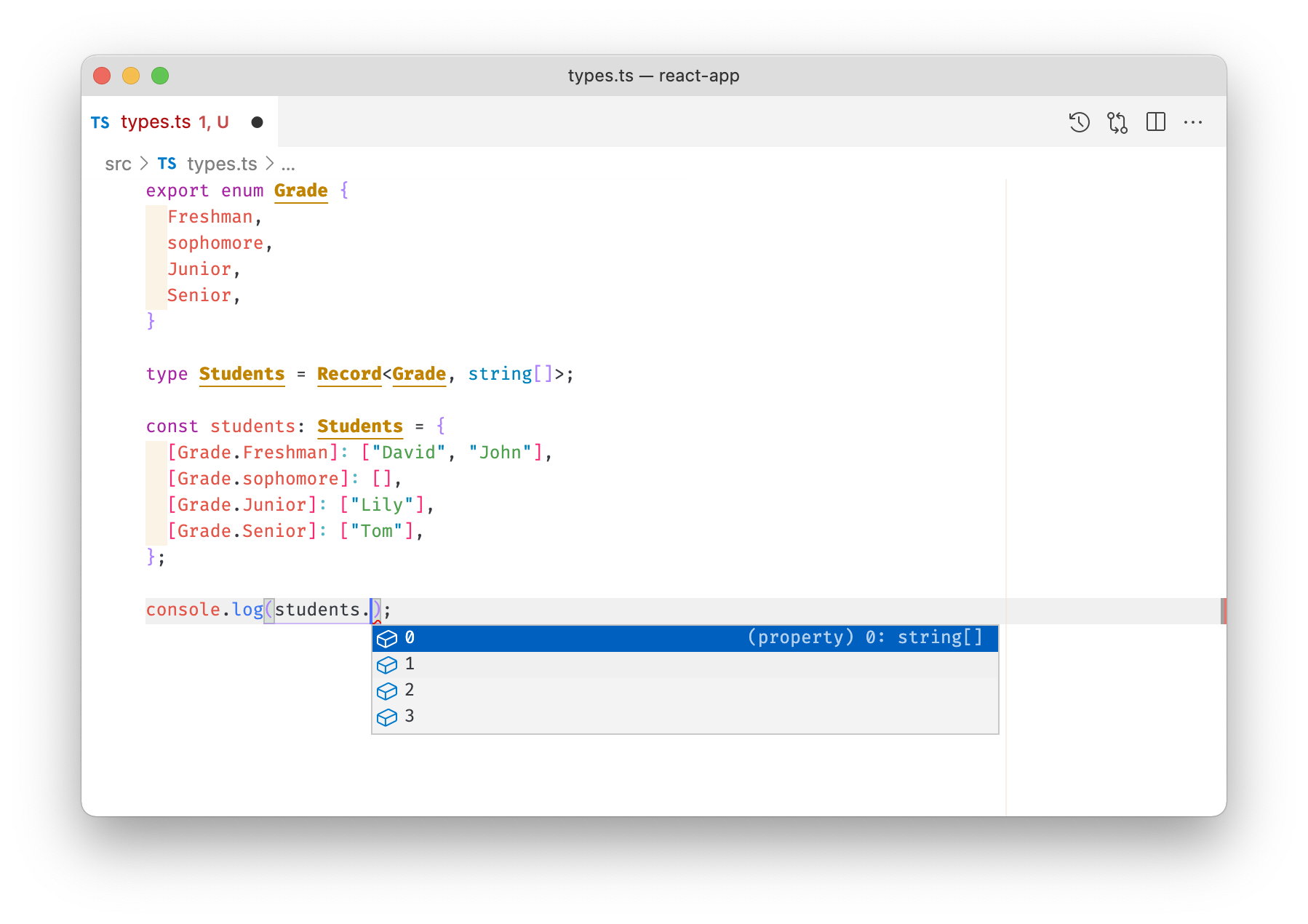|
当我们使用 TypeScript 时,我们想利用它提供的类型系统限制代码的方方面面,对象的键值,也不例外。 譬如我们有个对象存储每个年级的人名,类型大概长这样: type Students = Record<string, string[]>;
理所当然地,数据就是长这样: const students: Students = {
Freshman: ["David", "John"],
sophomore: [],
Junior: ["Lily"],
Senior: ["Tom"],
};
限制对象键名为枚举上面数据类型的问题是,年级是有限的几种可值取,而该对象上可任意添加属性,这样显得数据不够纯粹。 所以我们新增枚举,列出可取的值: export enum Grade {
Freshman,
sophomore,
Junior,
Senior,
}
现在,把对象的键名限制为上面枚举就行了。 - type Students = Record<string, string[]>;
+ type Students = Record<Grade, string[]>;
这样我们的数据可写成这样: const students: Students = {
[Grade.Freshman]: ["David", "John"],
[Grade.sophomore]: [],
[Grade.Junior]: ["Lily"],
[Grade.Senior]: ["Tom"],
// ❌ Object literal may only specify known properties, and 'blah' does not exist in type 'Students'.ts(2322)
blah: ["some one"],
};
这样,限制住了对象身上键名的范围,可以看到如果添加一个枚举之外的键会报错。 更加语义化的枚举值但上面的做法还是有不妥之处,因为枚举值默认是从 0 开始的数字,这样,作为键值就不够语义了,这点从访问对象的属性时体现了出来: 修正我们的枚举,用更加语义的文本作为其值: export enum Grade {
Freshman = "Freshman",
sophomore = "sophomore",
Junior = "Junior",
Senior = "Senior",
}
此时再使用该枚举时,得到的就不是无意义的数字了。 如果你愿意,枚举值也可以是中文, export enum Grade {
Freshman = "大一萌新",
sophomore = "大二学弟",
Junior = "大三学妹",
Senior = "大四老司机",
}
使用时也是没任何问题的: 键值可选上面的类型定义还有个问题,即,它要求使用时对象包含枚举中所有值,比如 // ❌ Property 'sophomore' is missing in type '{ Freshman: string[]; Junior: string[]; Senior: string[]; }' but required in type 'Students'.ts(2741)
const students: Students = {
[Grade.Freshman]: ["David", "John"],
// [Grade.sophomore]: [],
[Grade.Junior]: ["Lily"],
[Grade.Senior]: ["Tom"],
};
所以,优化类型为可选: type Students = Partial<Record<Grade, string[]>>;
限制对象的键名为数组中的值假若可选的值不是通过枚举定义,而是来自一个数组, const grades = ["Freshman", "sophomore", "Junior", "Senior"];
这意味着我们需要提取数组中的值形成一个联合类型。 首先利用const assertions 把数组转元组(Tuple)类型, const grades = <const>["Freshman", "sophomore", "Junior", "Senior"];
再利用 // 实际为 type Keys = "Freshman" | "sophomore" | "Junior" | "Senior"
type Keys = typeof grades[number];
最后数据类型和数据可写成: type Students = Partial<Record<Keys, string[]>>;
const students: Students = {
Freshman: ["David", "John"],
Junior: ["Lily"],
Senior: ["Tom"],
};
须知这种形式下,对象的 key 与原数组中元素其实没有语法层面的关联,即,编辑器的「跳转定义」是不可用的。 尽量还是保持代码之间的关联才能体现出 TypeScript 的作用,所以像这种只有类型约束而无法建立关联的操作是不建议的。 相关资源 |
|
The text was updated successfully, but these errors were encountered: |
-
TypeScript 中限制对象键名的取值范围
 CC BY-NC-SA 署名-非商业性使用-相同方式共享
CC BY-NC-SA 署名-非商业性使用-相同方式共享
-
相关阅读:
thinkPHP 无法加载控制器:Hello
在html中引用分享的链接
div中iframe高度自适应问题
php编写tcp服务器和客户端程序
Maximum Subsequence Sum (25)——改进版
水仙花数——升级版
数据结构实验八——队列打印杨辉三角
数据结构实验七——循环队列
数据结构实验六——链队列
水仙花数(20)
- 原文地址:https://www.cnblogs.com/Wayou/p/14787954.html



